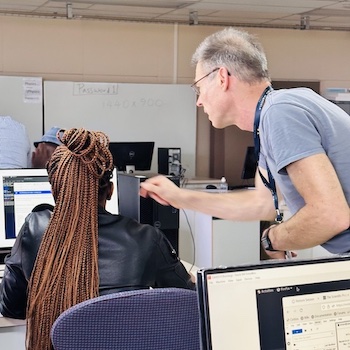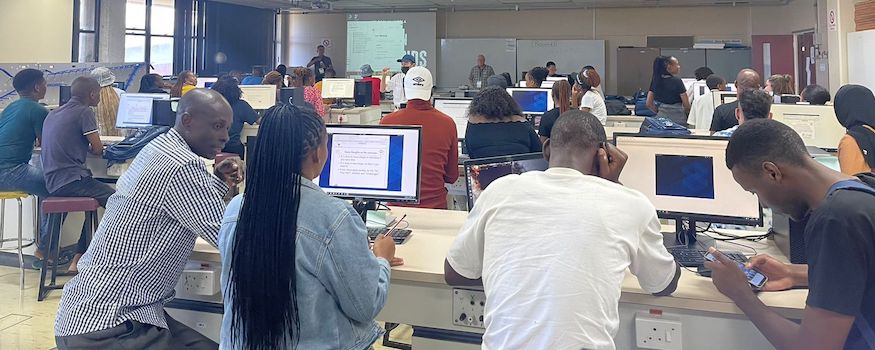| title | author | publish_on | type | canonical_url | image | description | excerpt | card_src | card_alt | banner_src | banner_alt | ||||||||
|---|---|---|---|---|---|---|---|---|---|---|---|---|---|---|---|---|---|---|---|
Distributed Computing at the African School of Physics 2022 Workshop |
Hannah Cheren |
|
user |
|
Over 50 students chose to participate in a distributed computing workshop from the 7th biennial African School of Physics (ASP) 2022 at Nelson Mandela University in Gqeberha, South Africa.
|
Over 50 students chose to participate in a distributed computing workshop from the 7th biennial African School of Physics (ASP) 2022 at Nelson Mandela University in Gqeberha, South Africa.
|
Image obtained from the official ASP2022 page on the African School of Physics website. |
Image obtained from the official ASP2022 page on the African School of Physics website. |
Over 50 students chose to participate in a distributed computing workshop from the 7th biennial African School of Physics (ASP) 2022 at Nelson Mandela University in Gqeberha, South Africa.
Image obtained from the official ASP2022 page on the African School of Physics website.Dr. Severini helping a student during ASP2022.
Almost 200 students from 41 countries were selected to participate in the 7th ASP 2022 at Nelson Mandela University in Gqeberha, South Africa. With the school being shortened to two weeks, a parallel learning system was implemented, where participants could choose lectures to attend to improve their educational growth. Dr. Horst Severini is a Research Scientist and Adjunct Professor in High Energy Physics and Information Technology from the University of Oklahoma (OU) and a co-leader of the high-performance computing workshop. He anticipated maybe 25 students attending on his track, “...we had about that many laptops,” he remarked, “and then we ended up with over 50 students!”
Severini was first introduced to distributed computing during his postdoc at OU. Then in the spring of 2012, Severini was introduced to Kétévi Assamagan, one of the founders of the ASP. Assamagan met with Severini and invited him and his colleagues to participate, leading to a scramble to create a curriculum for this new lecture series. They were eager to show students how distributed computing could help with their work.
After a few years of fine-tuning the high throughput classes, Severini has the workshop ironed out. After receiving an introduction to basic commands in Linux, the students started with a basic overview of high-energy physics, why computing is important to high-energy physics, and then some HTCondor basics. “The goal, really, is to teach students the basics of HTCondor, and then let them go off and see what they can do with it,” Severini explained. The workshop was so successful that students worked through coffee breaks and even stuck around at the end to obtain OSG accounts to continue their work.
A significant improvement for the 2022 high-performance computing workshop was the move from using OSG Connect for training sessions to Jupyter Notebooks. The switch to Jupyter Notebooks for training developed during the middle of 2022. “Jupyter allows people to ‘test drive’ submitting jobs on an HTCondor system without needing to create a full OSPool account,” OSG Research Computing Facilitator Christina Koch clarified. “Moving forward, we hope people can keep using the Jupyter Notebook interface once they get a full OSPool account so that they can move seamlessly from the training experience to all of the OSPool.”
Students working together and listening to a lecture during ASP2022.“[Jupyter Notebooks] worked quite well,” Severini said, noting that the only issue was that a few people lost their home directories overnight. However, these “beginning glitches” didn’t slow participants down whatsoever. “People enjoyed [the workshop] and showed it by not wanting to leave during breaks; they just wanted to keep working!”
Severini’s main goal for the high-performance computing workshop is to migrate the material into Jupyter Notebooks. “I’ve always been most familiar with shell scripts, so I always do anything I can in there because I know it's repeatable…but I’ll adapt, so we'll work on that for the next one,” he explains.
Overall, “everything’s been working well, and the students enjoy it; we’ll keep adjusting and going with the times!”
...
More information about scheduling and materials from the 7th ASP 2022. The 8th ASP 2024 will take place in Morocco, Africa. Check this site for more information as it comes out.
For more information or questions about the switch to Jupyter Notebooks, please email [email protected].
 on the African School of Physics website.](https://raw.githubusercontent.com/CHTC/Articles/main/images/asp-banner.jpeg)

